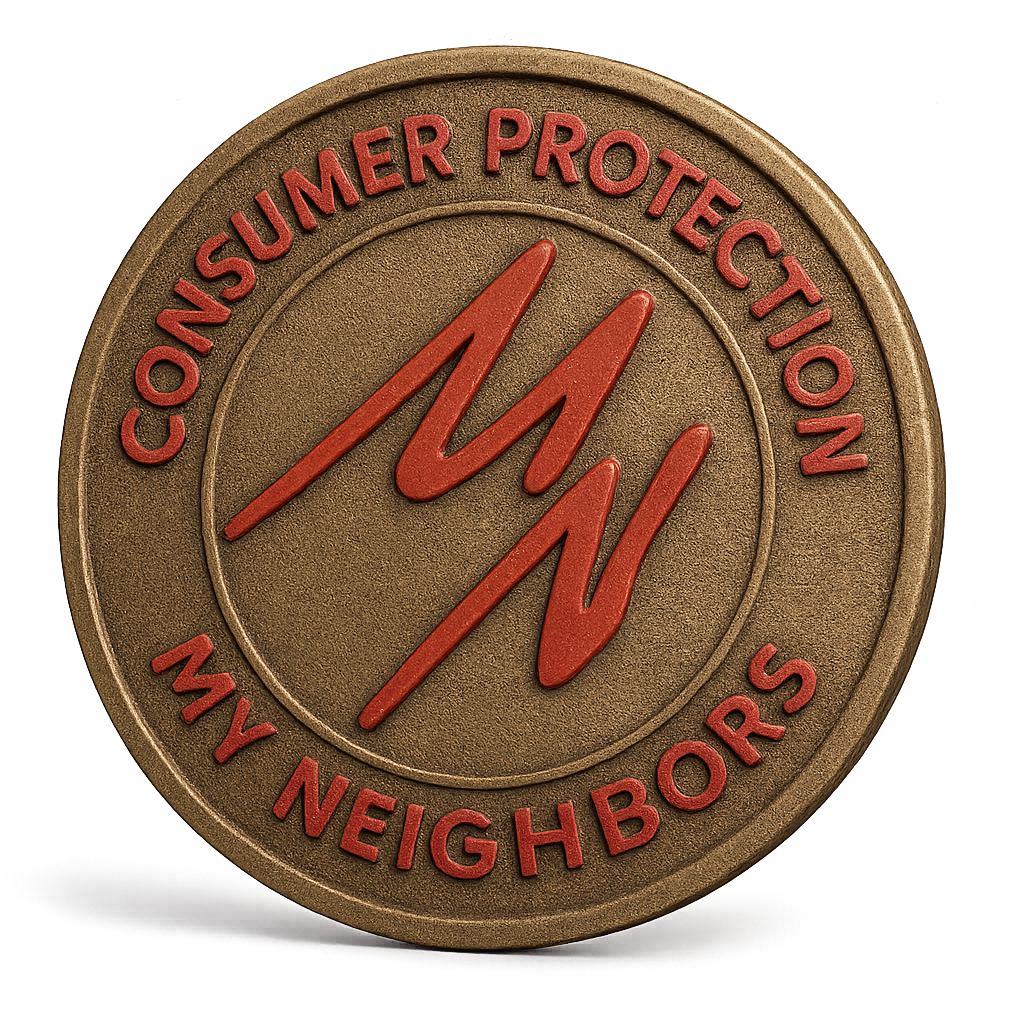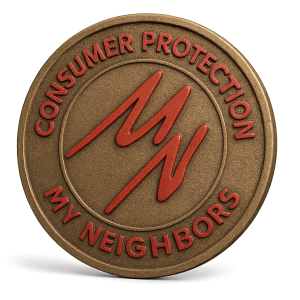Nigerian ‘Black Axe’ Gang: International Cybercrime and Its Georgia Connection Black Axe Logo Black Axe Black Axe Black Axe Courtesy of My …



Welcome to the Consumer Education and Awareness section of the My Neighbors website, your trusted source for empowering consumer knowledge in Chatham County. This resource is designed to educate residents on their consumer rights and responsibilities while providing actionable guidance on avoiding fraud, identifying unfair business practices, and spotting deceptive advertising. Explore expert tips on smart shopping, contract evaluation, and protecting yourself from unsafe products. Whether you are navigating a complex purchase or reviewing service terms, our mission is to help you make informed decisions and take control of your financial well-being with confidence and clarity.
Here’s a curated list of official links offering downloadable educational material on consumer protection and consumer rights, specifically from Georgia State, the Better Business Bureau (BBB), and Federal Government agencies. Each entry includes the agency name, link, and a concise description.
Georgia State Agencies
Georgia Department of Law – Consumer Protection Division
Link: https://consumer.georgia.gov/consumer-topics/publications-and-brochures
Description:
Download free brochures, guides, and fact sheets on topics such as scam prevention, credit, debt collection, home repair, landlord-tenant rights, and auto sales, all tailored for Georgia consumers.
Georgia Department of Banking and Finance – Consumer Resources
Link: https://dbf.georgia.gov/consumers/consumer-resources
Description:
Access downloadable guides covering banking, mortgages, credit unions, financial fraud, identity theft, and tips on protecting your financial interests as a Georgia resident.
Better Business Bureau (BBB)
Better Business Bureau – Consumer Resources
Link: https://www.bbb.org/all/bbb-consumer-tips
Description:
The BBB offers downloadable tip sheets and guides on avoiding scams, smart shopping, hiring contractors, credit, debt, and protecting your personal information in everyday transactions.
BBB Scam Tracker Resources
Link: https://www.bbb.org/scamtracker/resources
Description:
Find downloadable materials on current scam trends, fraud prevention, how to report scams, and how to recognize scam tactics, updated regularly by the BBB.
Federal Government Agencies
Federal Trade Commission (FTC) – Consumer Information
Link: https://consumer.ftc.gov/publications
Description:
The FTC provides a library of free publications on topics such as identity theft, credit, privacy, online safety, scams, debt, and shopping rights, available for download in PDF.
USA.gov – Consumer Protection
Link: https://www.usa.gov/consumer
Description:
Download guides and tip sheets covering your rights in credit, housing, privacy, telemarketing, travel, and product safety from a wide range of federal consumer protection agencies.
Consumer Financial Protection Bureau (CFPB) – Resources for Consumers
Link: https://www.consumerfinance.gov/resources/
Description:
Access brochures, fact sheets, and toolkits on topics like mortgages, debt collection, credit reports, and student loans, plus guides for avoiding financial scams and predatory lending.
U.S. Department of Justice – Elder Justice Initiative
Link: https://www.justice.gov/elderjustice/materials
Description:
Download educational materials about preventing elder fraud and abuse, including guides for seniors, caregivers, and professionals on spotting, stopping, and reporting elder exploitation.
Federal Communications Commission (FCC) – Consumer Guides
Link: https://www.fcc.gov/consumers/guides
Description:
Offers downloadable guides about robocalls, telemarketing scams, privacy, internet safety, phone fraud, and consumer complaint rights regarding communications services.
Federal Trade Commission Act (1914)
Purpose: Prohibits unfair or deceptive business practices, including false advertising and fraud.
Fair Credit Reporting Act (FCRA)
Purpose: Ensures accuracy, fairness, and privacy of consumer information in credit reporting.
Purpose: Mandates clear disclosure of loan terms, interest rates, and total costs to borrowers.
Fair Debt Collection Practices Act (FDCPA)
Purpose: Limits abusive practices by debt collectors and outlines consumers’ rights regarding debt disputes.
Consumer Product Safety Act (CPSA)
Purpose: Regulates the safety of consumer products and enforces recalls and bans.
Telephone Consumer Protection Act (TCPA)
Purpose: Regulates telemarketing, robocalls, and text marketing practices.
Purpose: Requires financial institutions to explain their information-sharing practices and protect consumer data.
Electronic Fund Transfer Act (EFTA)
Purpose: Protects consumers when they transfer funds electronically, including ATM and debit transactions.
Fair Business Practices Act (FBPA) – O.C.G.A. § 10-1-390
Purpose: Prohibits deceptive acts or practices in trade or commerce, including false advertising and misrepresentation of goods and services.
Georgia Lemon Law – O.C.G.A. § 10-1-780
Purpose: Provides legal remedies for consumers who purchase defective new vehicles that cannot be repaired after a reasonable number of attempts.
Motor Vehicle Franchise Practices Act – O.C.G.A. § 10-1-620
Purpose: Regulates relationships between car dealerships and manufacturers, ensuring fair treatment of consumers in motor vehicle transactions.
Credit Services Organization Act – O.C.G.A. § 10-1-390
Purpose: Protects consumers from deceptive practices by credit repair and debt relief companies.
Home Solicitation Sales Act – O.C.G.A. § 10-1-1
Purpose: Grants a three-day right to cancel for certain sales conducted in the consumer’s home.
Uniform Deceptive Trade Practices Act – O.C.G.A. § 10-1-370
Purpose: Allows for legal action against businesses that engage in misleading or deceptive advertising and business conduct.
Every Georgia resident is entitled to fair treatment when buying products, receiving services, or entering into financial agreements. Knowing your consumer rights is the first step toward protecting yourself from fraud, scams, or unfair business practices. In Georgia, these rights are upheld by both state and federal laws designed to ensure transparency, safety, and honesty in the marketplace.
Your Core Consumer Rights in Georgia:
The Right to Be Informed
You are entitled to clear, honest information about a product or service before making a purchase—including pricing, warranties, and risks.
The Right to Choose
Competition among businesses is protected to ensure consumers have access to a variety of options at fair prices.
The Right to Safety
Products sold in Georgia must meet safety regulations. If a product is defective or harmful, consumers have a right to seek recourse.
The Right to Be Heard
You can report grievances to government agencies, including the Georgia Attorney General’s Consumer Protection Division, which investigates and enforces laws against deceptive business practices.
The Right to Redress
Consumers have legal options to seek refunds, replacements, or compensation for faulty goods or services that don’t meet legal standards.
Where to Learn More:
Georgia Attorney General’s Consumer Protection Division
Offers education, complaint forms, and legal support for consumer issues.
GeorgiaLegalAid.org
Provides guides and legal resources tailored for Georgia residents.
Federal Trade Commission
Protects consumers nationwide and educates the public on their rights related to fraud, credit, privacy, and more.
Understanding your rights empowers you to make informed decisions and take action when those rights are violated. For Chatham County residents, additional support is available through local legal aid offices and the My Neighbors Consumer Protection Center.
In Chatham County, Georgia, if you have a clearly posted "No Soliciting" sign and have personally informed a door-to-door salesperson that you’re not interested, yet they continue to return, you may take the following steps.
Can I cancel a contract I signed at my home within a few days?
Yes. Under Georgia's Home Solicitation Sales Act, you have three business days to cancel contracts made in your home (or non-retail locations) for goods or services over $25.
Do I have the right to dispute a bill I believe is incorrect?
Yes. Georgia law gives you the right to dispute billing errors in writing within 60 days of receiving the statement. This applies to credit card and certain other financial accounts.
If I buy a car “as-is,” do I have any protections?
Yes. Even if a car is sold “as-is,” Georgia’s Fair Business Practices Act still prohibits dealers from engaging in fraudulent or deceptive practices, such as hiding known issues or odometer tampering.
Can a business legally refuse to give me a refund?
Yes, but only if it clearly discloses the policy before the transaction. If a refund or exchange policy is not posted or stated, consumers may have a right to a refund under Georgia law.
Do I have rights if a business damages my credit with incorrect reporting?
Yes. The Fair Credit Reporting Act and state law require businesses to provide accurate information. You have the right to dispute incorrect items and request corrections.
Are layaway plans regulated in Georgia?
Yes. Retailers offering layaway must disclose the terms in writing, including payment schedules, cancellation policies, and any penalties.
Can a debt collector contact me at work or during odd hours?
No. Georgia follows federal FDCPA guidelines, which prohibit collectors from calling before 8 a.m. or after 9 p.m., or at work if you’ve asked them not to.
Can a business use misleading pricing like “bait and switch”?
No. Georgia’s consumer protection laws ban bait-and-switch advertising, where a business lures you with a deal it doesn’t intend to honor, then pressures you into a more expensive alternative.
If I buy a defective product, must the company repair or replace it?
Not always—but if there’s a warranty or implied warranty, the seller may be legally required to repair, replace, or refund under Georgia law or the federal Magnuson-Moss Warranty Act.
Can I sue a business for repeated robocalls or spam texts?
Yes. Both Georgia and federal law allow you to file a civil claim for damages if a company repeatedly contacts you with robocalls or unsolicited messages after you’ve opted out.


Consumer Protection Pages
Consumer Protection Articles
Nigerian ‘Black Axe’ Gang: International Cybercrime and Its Georgia Connection Black Axe Logo Black Axe Black Axe Black Axe Courtesy of My …
Top Consumer Complaints Consumer Complaint Courtesy of My Neighbors Introduction This report outlines the five most common consumer complaint categories impacting Georgia, …
Identity Theft in Georgia: A Growing Concern Identity Theft Identity theft remains a significant issue across the United States, with Georgia consistently …
The “What’s Up?” Text Scam The Whats Up Text Scam Have you ever received a text message from an unknown number that …

